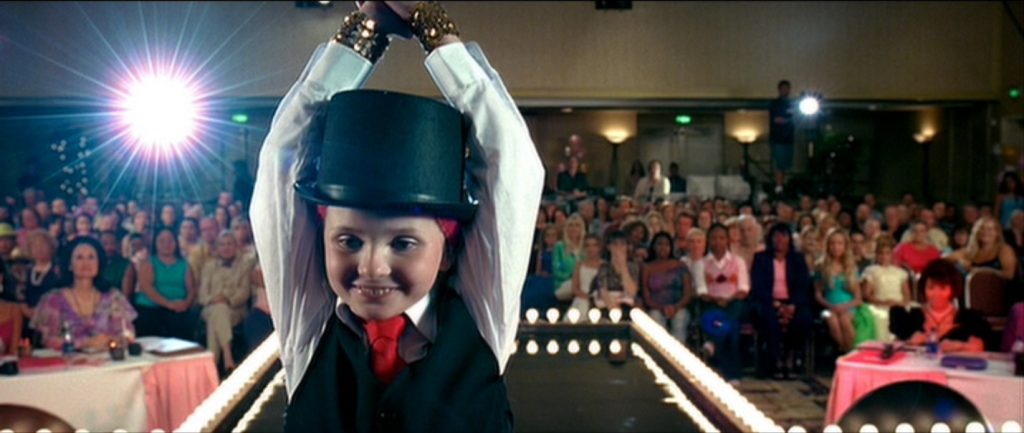
Film Matters: Please tell us about your article that is being published in Film Matters.
Joe Day: This article examines British horror films that have used historical events of the nation to fuel their narratives.
Continue reading
Film Matters: Please tell us about your article that is being published in Film Matters.
Joe Day: This article examines British horror films that have used historical events of the nation to fuel their narratives.
Continue reading
Keywords: femininity, gender performance, drag, pageant, post-feminism, Little Miss Sunshine, Dumplin’
“There’s an absurdity involved in wearing a bathing suit with heels,” says Kimberly H. Hamlin, author of an article on the first years of the Miss America beauty pageant. “Are we supposed to actually do something in a swimsuit or just look good?” (qtd. in Bernard). According to the pageant industry, it’s the latter. Pageant films don’t say any differently, highlighting the rigorous discipline required to even be a contestant, let alone to wear the crown. From thriller-comedy Drop Dead Gorgeous (Jann, 1999) and the everlasting Miss Congeniality (Petrie, 2000) to roller derby drama Whip It (Barrymore, 2009), the pageant industry’s high standards of femininity are exemplified through women who threaten to transgress them. Little Miss Sunshine (Faris and Dayton, 2006) and Dumplin’ (Fletcher, 2018) are no exception, featuring main characters who challenge these expectations, whether or not they intend to do so. Through the talent category of the pageant in each film, Olive (Abigail Breslin) and Will (Danielle Macdonald) expose gender as a performance, simultaneously transgressing the pageant’s definition of femininity and exuding to-be-looked-at-ness; furthermore, each film critiques sexism while engaging with post-feminism, albeit to different extents.
Continue readingFilm Matters is pleased to report that FM 10.3 (our final issue of 2019) is now officially out electronically via Ingenta and EBSCO. (Due to the COVID-19 situation, print copies will follow once the Intellect offices are back open.)
In this issue, you will find our remembrance of John Pruitt:
As well as the following peer-reviewed feature articles:
The “Based on Actual Events” Dossier, edited by Fabrizio Cilento and students at Messiah College:
The “Catastrophe!” Dossier, edited by Tom Ue and students at Dalhousie University:
It’s another big issue! And one that we are proud of. For more details about this issue, please visit: https://www.ingentaconnect.com/content/intellect/fm/2019/00000010/00000003
Are you an undergraduate author who wants to be published in Film Matters? Then we want to work with you! Please check out our current CFPs.
And stay healthy!
Film Matters is officially announcing Chapman University’s first special issue CFP 12.2 on “The Monstrous.” This themed call is soliciting work from undergraduates and recent graduates for consideration in issue 12.2 (2021).
The deadline is December 1, 2020.
Film Matters has officially adopted MLA 8th edition style (and is moving away from 7th edition guidelines) — so please prepare your submissions accordingly. Purdue OWL’s MLA Formatting and Style Guide (https://owl.purdue.edu/owl/research_and_citation/mla_style/mla_formatting_and_style_guide/mla_formatting_and_style_guide.html) is an excellent resource to consult, in this regard.
For more information about this call for papers, please download the official document (PDF):
Submissions should include a cover sheet, which includes the author’s name, title of essay, institutional affiliation, and contact information; all other identifying information should be removed from the body of the text, in order to aid the blind peer review process.
And submissions and questions should be directed to:
Please note that Film Matters does not accept submissions that are currently under review by other journals or magazines.
Undergraduates and recent graduates, please submit your film-related research papers today! Chapman University looks forward to receiving your papers!

Film Matters is pleased to announce a new academic partnership with Chapman University in Orange, California. Starting with issue 12.2 (2021), Chapman University will joint edit six issues — FM 12.2 (2021), FM 13.2 (2022), FM 14.2 (2023), FM 15.2 (2024), FM 16.2 (2025), and FM 17.2 (2026) — along with the University of North Carolina Wilmington (UNCW), providing peer-reviewed and edited content according to set themes (the first theme, CFP 12.2, will be on “The Monstrous”). Kelli Fuery, Associate Professor in Film Studies at Chapman University, will serve as the new Special Issues Editor, leading the Chapman effort in this initiative. Fuery brings plenty of Film Matters experience to this project, having guest edited a dossier on screened violence for issue 8.1 (2017) as well as the entire issue 9.2 (2018) on neglected cinemas and post-global politics. She also served as a judge for the Masoud Yazdani Award for Excellence in Undergraduate Film Scholarship in 2017.
Kelli Fuery is Associate Professor of Film Studies in Dodge College of Film and Media Arts at Chapman University. Her publications include: Visual Cultures and Critical Theory (co-authored, 2003), New Media: Culture and Image (2008), and Wilfred Bion, Thinking and Emotional Experience with Moving Images (2018). Her research focuses on psychoanalytic and philosophical approaches to film and media, exploring issues of embodiment, theories of power, cultural identity politics, affect and emotion. Her current project examines Simone de Beauvoir’s theory of ambiguity in relation to women’s filmmaking.
Chapman University’s mission is to provide personalized education of distinction that leads to inquiring, ethical, and productive lives as global citizens. The BA in Film Studies at Dodge College of Film and Media Arts offers a comprehensive study of film, exploring historical, critical, and theoretical aspects of cinema, engaging with global and diverse filmmakers to consider inclusive perspectives on the art of the moving image.
Students wanting to submit papers for Chapman’s themed calls will use specialtopicsfilmmatters AT gmail.com for submissions and inquiries; while students seeking UNCW’s standard open calls will still use futurefilmscholars AT gmail.com. East Coast to West Coast, Film Matters is excited to expand its outreach to undergraduate students writing and thinking about film. Chapman and UNCW look forward to hearing from you!
Film Matters is excited to announce the release of issue 10.2 — guest edited by The Ohio State University’s Margaret C. Flinn, with the help of Associate Guest Editor Anna Talarico and undergraduate students — on the theme of documentary!
In this issue, you will find the following feature articles:
And these featurettes:
As well as book, film, and DVD/Blu-ray reviews by: Jack Corbett, Brian C. Davis, Austin Graham Dunn, Rylan Lee, Nick Michael, Cari Milowicki, Jonathan T. Pearce, Jordan Michael-Victor Penrose, Jenicka Roche, and Kelly Rudolph.
For more details about this issue, please visit: https://www.ingentaconnect.com/content/intellect/fm/2019/00000010/00000002
We love to work with guest editors! And we’re always looking for new undergraduate authors! So if you have an idea for an issue or are interested in publishing, please get in touch with us today.
Stay healthy!
Film Matters: Please tell us about your article that is being published in Film Matters.
K. M. Wise: My article that is being published in Film Matters is titled “Generational Horror: A Comparison of Tim Curry’s and Bill Skarsgård’s Portrayals of Pennywise in Stephen King’s IT.” I started writing this research paper in the fall of 2017 almost immediately after the remake was released. I was incredibly taken with the film and I knew that I wanted to start some kind of conversation surrounding how spectacular I thought it to be. I finally found my inspiration in the changes made from the original miniseries to the new film and what that could tell us about the millennial generation.
Continue readingFilm Matters is pleased to announce that Michael Benton, Humanities Professor at Bluegrass Community & Technical College (BCTC) in Lexington, KY, has agreed to serve as our inaugural Community College Editor. Starting with issue 12.1 (2021), Film Matters will regularly feature the film and media studies writing/analytical work of community college students in the United States and beyond. Recognizing that the undergraduate experience in the US is more often starting at community college, and celebrating the vital role community colleges play in higher education access, Film Matters is excited to outreach to this important academic audience.
Michael Benton grew up in San Diego and left to go to college in the Midwest (degrees in Accounting, English/History and Cultural Studies) before settling in the borderline South. He has been living and working in the Bluegrass Region of Kentucky since 2002. At BCTC he teaches courses on Film Studies, World Cinema, Peace & Conflict Studies, and Writing/Rhetoric. Since he is often overwhelmed by the sheer volume of materials necessary to even stay barely conversant with these subjects, he archives resources at his website Dialogic Cinephilia (http://internationalfilmstudies.blogspot.com/) for his teaching and for anyone else it would help make sense of the world. He has also been running the Bluegrass Film Society for fifteen years. Here are some of the past schedules: http://internationalfilmstudies.blogspot.com/2013/08/bluegrass-film-society-schedules.html.
If you are a community college educator and would like to get your students involved with Film Matters, Michael wants to work with you! And if you are a community college student looking for publication experience, Michael wants to hear from you! He can be reached at michael.benton AT kctcs.edu (please put Film Matters in the subject line).
Film Matters: Please tell us about your article that is being published in Film Matters.
Eduard Saakashvili: I analyze the documentary representation of critical theorists. Specifically, I look at how the filmic representation of their ideas interacts with the filmic representation of their personas.
Continue readingFilm Matters: Please tell us about your article that is being published in Film Matters.
Safwat Nazzal: My article examines Maysoloun Hamoud’s Bar Bahar, as a contemporary Palestinian film that delivers profound meditations on the stagnation of cultural identity through an auto-critique of the intersectional oppression faced by Palestinian women.
Continue reading